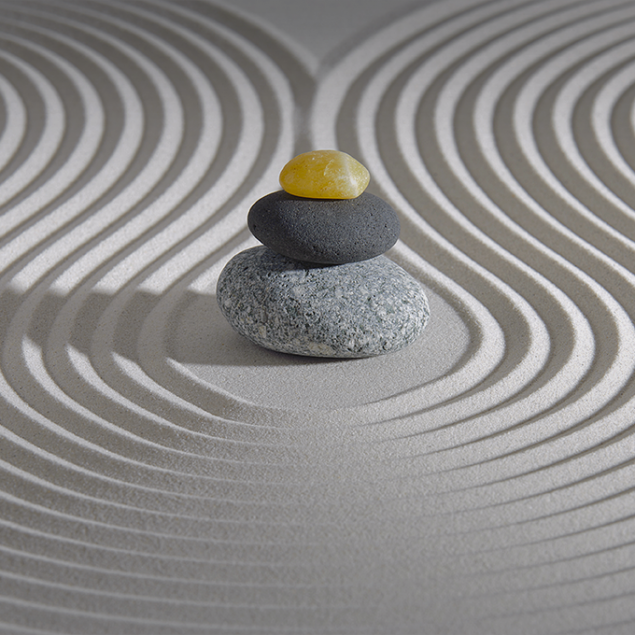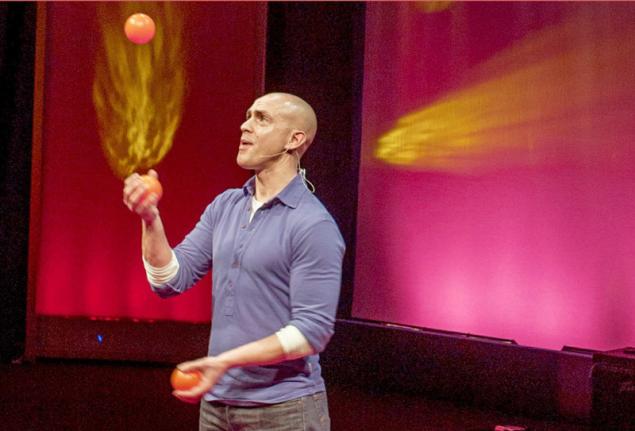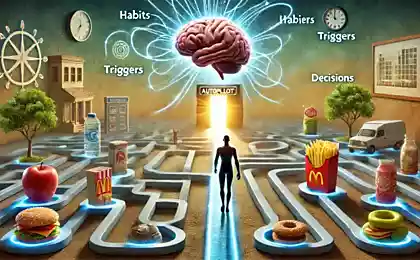580
Awareness in action: how to learn to live life to the fullest
Although mindfulness requires constant effort, but this, like meditation, requires a special kind of effort, natural and spontaneous. It is only whenever notice when thoughts or feelings force you to escape from reality, and at the same time to redirect your attention where you want it.
No matter are you focusing on the taste of food absorbed, the movement of hands, opening or closing the door, the weight of your body standing on the chair, feeling the water, washing your skin in the shower, body contact with your baby, the smell of toothpaste during brushing or just a glass of water that you drink.

Awareness applies to every little thinggiven to you in sensations, without exception. No matter whether the classroom is active and does not require physical effort, whether you are at home or on the street, at work or during leisure time, alone or in company. If you are just beginning to grasp the idea of involvement, initially all of this may confuse you.
People regularly ask me whether they now walk the streets with my eyes closed, focusing on your own breathing. No, please don't do this! So it can be easily and under the car to get. In addition, we are talking about total awareness, and not on the specific process of meditation, so close your eyes and focus on breathing should not be. Remember: involvement means full awareness of the moment, understanding where you are and what you are doing. You will behave exactly the same as usual. You just have to constantly stay on, and the easiest way to do this is to choose a specific object and focus on it.
Every time you realize that you have forgotten about it, you just come back the thoughts to the object of his attention. One of my favorite examples — brushing teeth. This action is familiar to all, it lasts no more than two minutes, without explanation it is clear what you are focusing, and chances are good that you will be able to finish this process, keeping the engagement. And this is a big difference from the usual for most people the way to carry out this simple hygiene procedure is full automatic, the thoughts about what needs to be done then.
To fully understand the difference between the two scenarios is who should be worried. Try how it feels.
Perhaps you can easily focus on physical sensations, turning them into a focal point. It could be the sound of the brush scrubbing teeth, the sensations that it causes in the hand the uniform back and forth movement, taste or smell of toothpaste. If you focus on a single feeling, your mind will feel calmer. And calmed down, you may notice the habit to be distracted by extraneous thoughts or to jump from one thought to another.
Maybe you will notice that spend too much or too little effort directly to clean your teeth. There's a chance that you'll even record a sense of boredom. All these observations on their own are useful, because they allow you to see your own consciousness as it really is. This focus reflects the difference between a stable, calm the mind and consciousness, out of control. Refer to the example. Suppose you were going to drink a glass of water. Instead of gulp to drink water, try to focus on the resulting experience.
Seriously, when was the last time you felt the taste of the water that you drink?
Barely taking the glass in hand, you get information about the temperature of the water and the material from which made the glass. You can pay close attention to how your hand moves to your mouth, the taste of the water that fills the mouth. Learning to listen to your feelings, you will be able to see how water moves through the throat and into the stomach. If at some point you notice that your mind wanders somewhere far away, just re-focus your attention on how you drink.
"Imagine what it's like to be close to the person, capable to pay you all his attention without the rest"
When you begin to practice this approach in different situations, you will notice that it effectively calms the mind. You not only get fully aware in each moment of experience, in every sense of the word live life to the full, but calm down. And along with calmness comes clarity. You begin to understand how and why you think and feel, and why it happens that way. You begin to notice patterns and trends in your consciousness. As a result, you regain the ability to decide for themselves how to live. Instead of mindlessly rushing in a stream of destructive, unproductive thoughts and emotions, you may react the way you think is best.
Another popular question — how does this reception in the presence of strangers? Would not such a concentration in the company of other people look rude?
To me these fears seem ridiculous: because such a question assumes that we are usually so focused on words, feelings and emotions of others that we more on what is missing.
You know, in reality this occurs very rarely.
Often we are so immersed in their own thoughts that is not able to truly hear the words of the interlocutor. Suppose you are walking down the street, chatting with a friend. In principle, the walk — the action is Autonomous, and yet you spend some of your attention to not collide with other passers-by, accidentally not to go on the roadway and so on. Only in those moments when you are occupied with the corresponding observations, you can switch the attention to chat with a friend.
This, however, does not mean that you give to interviewee less attention than normal — it simply means that you as often as necessary to switch from one object to another, in this case — with the environment a conversation with a friend. In such a situation, your attention to your own thoughts and feelings will not be as full as if you were sitting and meditating in solitude — at least at first, but most importantly — commitment to stay involved. The more you practice, the easier you will be given this practice and the more successful you will be able to hold the attention.
Involvement now will allow you to fully be "in the same room" with someone.
One woman came to my clinic, told how uses this method to contact with the child and how he helps her to truly be with him. According to her, although previously she had just been there with the baby, her thoughts wandered.
Only by learning to really feel involved in the communication with the child, she realized the completeness of their interactions. A similar experience can have a limitless impact on our communication with others. Imagine what it's like to be close to the person, capable to pay you all his attention without the rest, and how nice it would be to give him an equally undivided attention in return.
The beauty of mindfulness is that you don't have to spend her extra time. You only need to learn to fully immerse yourself in the action in the present, instead of wandering somewhere in the unknown distance. This is a response to those who say that doesn't have free time for practising. A long time ago I was told a story about an American who has taught meditation who was trained as a monk in Thailand. He went there in the 1960-1970-ies, together with many others, while EN route paths hippies in Asia. During his travels he became interested in meditation and decided that you are ready to spend all their time training. Going to one of the most famous in Thailand teachers, he settled in the monastery and began training, eventually becoming a monk. His training schedule was very tight: he had to devote his time exclusively to training and work. The meditation took about eight hours a day.
If you never had to live in a monastery, eight hours can seem a long enough period of time. However, in such places they fly in the blink of an eye. Of course, the rest of the time students devote to training consciousness in the form of understanding the present and apply engagement to your daily life.
Since this route travels through Asia gradually gained popularity, while training of this man, the monastery was visited by many Western tourists. Some of them stayed there for a few weeks then to continue their journey. Living in the monastery, of course, they always engage in conversations with tenants representatives of the Western countries.
In the course of these conversations our monk learned that in neighbouring Burma, there are monasteries, the inhabitants of which devote meditation about 18 hours a day. Burning enthusiasm and dreams as soon as possible to advance the study of meditation, he began to seriously think about moving.
But he could not overcome his doubts: after all, the teacher who taught it was very well known and respected. Few months he suffered, unable to decide whether to leave him or stay. He believed that soon will reach enlightenment by meditating 18 hours a day in one of the Burmese monasteries. Indeed, in his monastery, and he was constantly busy — engaged in cleaning, collecting firewood for kindling, darned robes, and so forth; it seemed to him that after all this, he had little time for meditation. In addition, the study seemed to him difficult, and he suspected that the work was somehow distracting him from his studies.In the end he went to the teacher to warn about his impending departure. Secretly he had hoped that seeing his enthusiasm and dedication, the teacher will give him the opportunity to stay and spend more time on meditation. However, upon hearing it, he just quietly nodded.
"Each of us has 24 hours a day, that is the same amount of time that we can use, learning conscious relation to reality"
The apparent indifference of the teacher ruffling our enthusiast. He truly didn't understand what was happening. — Do you not even want to know why I quit?! he exclaimed.
— Well, tell me, ' replied the teacher still care.
— Because here we have no time to meditate! — exclaimed the monk. — In Burma, the monks engaged in meditation for 18 hours a day, and we are only eight. How can I progress in the training, if the whole day just doing that cook and clean and mend? We have here more than anything, not enough time!
Tell the teacher looked at him carefully, but the question he asked with a smile.
— Do you think that you don't have time to realize what was happening? he asked. — Do you think that you don't have the time to understand?
The disciple immersed in the internal dialogue, I did not even realize what it was, and answered with irritation: 'of Course. We are so busy that we have no time to realize now.
The teacher laughed.
'So,' he said, ' when you sweep the yard, you are not able to understand the process of sweeping? When you RUB robes, you can't surrender yourself fully to the process of Ironing? The meaning of training the mind in mindfulness. You can realize what is happening with the same success, when you sit with your eyes closed in the temple, as when you sweep the yard and your eyes while being open!
The student paused, realizing how his understanding of consciousness training, it was far from the truth. Like many others, including myself, he believed that working on their consciousness is possible only when you sit quietly and meditate. In practice, however, this process is much more diverse. The practice of mindfulness teaches us that we can use the same powers of our mind, whatever we are doing. No matter whether physical work or lead a sedentary lifestyle, engagement is possible as well to practice riding bikes, and sitting at home in the chair. No matter what business we're busy. Each of us has 24 hours a day, that is the same amount of time that we can use, learning conscious relation to reality. No matter whether we're aware of physical sensations, emotions, thoughts or their contents — all different facets of awareness that we always have time.
Remember how in elementary school drawing, connecting a number of dots?
Remember those pictures where the image was marked with a number of small points? Usually they were so close to each other that you had to do was draw a line on the paper, in the end having the feeling that you've created your personal masterpiece.
This image is composed of points, is a clear illustration of how engagement can become something more than a meditative exercise done once a day.
Take a clean sheet of paper and try to hold a straight line across the entire sheet. I think even if you have a great eye, your hand still shakes a couple of times. If you are strong in these exercises, irregularities will be quite a lot. This line is a visual representation of how you feel awareness during the day. Living the moment consciously, you feel at peace, focus and meaning to your actions. Don't forget: even if you are not experiencing positive emotions, you still feel a certain emotional freedom, a future, stability sensations. However, like you held on the paper line, the idea of constant awareness many seem very shaky.
"Try to think of mindfulness as a quality that you can use throughout the day. Remember that you need to devote to each case, whatever it was"
Suppose you woke up feeling great, for some reason deciding that today was a holiday. But then you realize that you have a normal working day, and depressed. You climb out of bed, immediately tripping over the cat and loudly cursing, and go into the bathroom. After Breakfast, you already feel much better and I think that, in the end, the day is not so bad. But before you go out, you get an e-mail from the boss that requires you to work late. "Of course, just that — me!" — think you. Leaving the apartment, you loudly slam the door with an oath to herself.
When they reached the office, you will know that stay at work has asked all employees, not just you, and it becomes easier. Then you see on the table a large plate of cakes. You smile, you already salivating.
"Probably someone's birthday — you think. — We ought to take a break and drink coffee." But then the question about the cakes begins to take you seriously.
You remember that for quite some time sitting on a diet, which proved very successful: in fact, should you eat these sweets? On the other hand, you are trying to learn to treat myself kinder, maybe it is worth to afford one cake? You completely confused. You want a brownie... no you don't want it. So passes day after day, and the events are accompanied for you a succession of UPS and downs. During the day only one thing remains constant: your own feelings determine your mood. In the absence of awareness and understanding the power of feelings over you is boundless.
Well, now let's try otherwise to imagine what is happening. Imagine that on a sheet of paper already suffered a series of small dots extending from one sheet edge to another. Each point thus located very close to the previous one. Imagine that you need to spend on this sheet exactly the same straight line. I think in this case the task will be much easier. When you spend on the paper line, you don't need to think about how to bring her to the edge, enough to focus at a distance of a few millimeters from one point to another. It turns out that to draw a straight is not too difficult! If we continue the analogy with preservation of awareness and, consequently, emotional stability, and this news will seem to us to be quite inspiring.
Instead of trying to keep involvement during the daily ten minute morning meditation, and then try to stretch it for the remaining twenty three hours and fifty minutes until the next exercise, try to perceive mindfulness as a quality that you can use throughout the day.

Remember that you need to devote to each case, whatever it was. It means that you in any case don't have to think about where you'd rather be, what do you most attracted to at the moment, and generally dream about that in your life something has changed, that is, to abandon the usual way of thinking, which drives you into an ongoing stress. Instead, you should only think about what people are doing at the moment.
Thus, realizing that the working day starts, you don't have to fall into depression. You should just be aware of how you react to the opened you the truth, watching the arising and ceasing of emotions, caused by this realization. Tripping over the cat, it is not necessary to swear: it is better to bend and make sure the animal is all right.
Think about the health of your four-legged friend and not about your own irritation. Forgetting his frustration, replacing it with a simple act of kindness, you will begin the day anew. And then continue in the same spirit, moving from one task to another, filling each step with meaning, focus and understanding. published
P. S. And remember, only by changing their consumption — together we change the world! ©
Join us in Facebook , Vkontakte, Odnoklassniki
Source: theoryandpractice.ru
No matter are you focusing on the taste of food absorbed, the movement of hands, opening or closing the door, the weight of your body standing on the chair, feeling the water, washing your skin in the shower, body contact with your baby, the smell of toothpaste during brushing or just a glass of water that you drink.

Awareness applies to every little thinggiven to you in sensations, without exception. No matter whether the classroom is active and does not require physical effort, whether you are at home or on the street, at work or during leisure time, alone or in company. If you are just beginning to grasp the idea of involvement, initially all of this may confuse you.
People regularly ask me whether they now walk the streets with my eyes closed, focusing on your own breathing. No, please don't do this! So it can be easily and under the car to get. In addition, we are talking about total awareness, and not on the specific process of meditation, so close your eyes and focus on breathing should not be. Remember: involvement means full awareness of the moment, understanding where you are and what you are doing. You will behave exactly the same as usual. You just have to constantly stay on, and the easiest way to do this is to choose a specific object and focus on it.
Every time you realize that you have forgotten about it, you just come back the thoughts to the object of his attention. One of my favorite examples — brushing teeth. This action is familiar to all, it lasts no more than two minutes, without explanation it is clear what you are focusing, and chances are good that you will be able to finish this process, keeping the engagement. And this is a big difference from the usual for most people the way to carry out this simple hygiene procedure is full automatic, the thoughts about what needs to be done then.
To fully understand the difference between the two scenarios is who should be worried. Try how it feels.
Perhaps you can easily focus on physical sensations, turning them into a focal point. It could be the sound of the brush scrubbing teeth, the sensations that it causes in the hand the uniform back and forth movement, taste or smell of toothpaste. If you focus on a single feeling, your mind will feel calmer. And calmed down, you may notice the habit to be distracted by extraneous thoughts or to jump from one thought to another.
Maybe you will notice that spend too much or too little effort directly to clean your teeth. There's a chance that you'll even record a sense of boredom. All these observations on their own are useful, because they allow you to see your own consciousness as it really is. This focus reflects the difference between a stable, calm the mind and consciousness, out of control. Refer to the example. Suppose you were going to drink a glass of water. Instead of gulp to drink water, try to focus on the resulting experience.
Seriously, when was the last time you felt the taste of the water that you drink?
Barely taking the glass in hand, you get information about the temperature of the water and the material from which made the glass. You can pay close attention to how your hand moves to your mouth, the taste of the water that fills the mouth. Learning to listen to your feelings, you will be able to see how water moves through the throat and into the stomach. If at some point you notice that your mind wanders somewhere far away, just re-focus your attention on how you drink.
"Imagine what it's like to be close to the person, capable to pay you all his attention without the rest"
When you begin to practice this approach in different situations, you will notice that it effectively calms the mind. You not only get fully aware in each moment of experience, in every sense of the word live life to the full, but calm down. And along with calmness comes clarity. You begin to understand how and why you think and feel, and why it happens that way. You begin to notice patterns and trends in your consciousness. As a result, you regain the ability to decide for themselves how to live. Instead of mindlessly rushing in a stream of destructive, unproductive thoughts and emotions, you may react the way you think is best.
Another popular question — how does this reception in the presence of strangers? Would not such a concentration in the company of other people look rude?
To me these fears seem ridiculous: because such a question assumes that we are usually so focused on words, feelings and emotions of others that we more on what is missing.
You know, in reality this occurs very rarely.
Often we are so immersed in their own thoughts that is not able to truly hear the words of the interlocutor. Suppose you are walking down the street, chatting with a friend. In principle, the walk — the action is Autonomous, and yet you spend some of your attention to not collide with other passers-by, accidentally not to go on the roadway and so on. Only in those moments when you are occupied with the corresponding observations, you can switch the attention to chat with a friend.
This, however, does not mean that you give to interviewee less attention than normal — it simply means that you as often as necessary to switch from one object to another, in this case — with the environment a conversation with a friend. In such a situation, your attention to your own thoughts and feelings will not be as full as if you were sitting and meditating in solitude — at least at first, but most importantly — commitment to stay involved. The more you practice, the easier you will be given this practice and the more successful you will be able to hold the attention.
Involvement now will allow you to fully be "in the same room" with someone.
One woman came to my clinic, told how uses this method to contact with the child and how he helps her to truly be with him. According to her, although previously she had just been there with the baby, her thoughts wandered.
Only by learning to really feel involved in the communication with the child, she realized the completeness of their interactions. A similar experience can have a limitless impact on our communication with others. Imagine what it's like to be close to the person, capable to pay you all his attention without the rest, and how nice it would be to give him an equally undivided attention in return.
The beauty of mindfulness is that you don't have to spend her extra time. You only need to learn to fully immerse yourself in the action in the present, instead of wandering somewhere in the unknown distance. This is a response to those who say that doesn't have free time for practising. A long time ago I was told a story about an American who has taught meditation who was trained as a monk in Thailand. He went there in the 1960-1970-ies, together with many others, while EN route paths hippies in Asia. During his travels he became interested in meditation and decided that you are ready to spend all their time training. Going to one of the most famous in Thailand teachers, he settled in the monastery and began training, eventually becoming a monk. His training schedule was very tight: he had to devote his time exclusively to training and work. The meditation took about eight hours a day.
If you never had to live in a monastery, eight hours can seem a long enough period of time. However, in such places they fly in the blink of an eye. Of course, the rest of the time students devote to training consciousness in the form of understanding the present and apply engagement to your daily life.
Since this route travels through Asia gradually gained popularity, while training of this man, the monastery was visited by many Western tourists. Some of them stayed there for a few weeks then to continue their journey. Living in the monastery, of course, they always engage in conversations with tenants representatives of the Western countries.
In the course of these conversations our monk learned that in neighbouring Burma, there are monasteries, the inhabitants of which devote meditation about 18 hours a day. Burning enthusiasm and dreams as soon as possible to advance the study of meditation, he began to seriously think about moving.
But he could not overcome his doubts: after all, the teacher who taught it was very well known and respected. Few months he suffered, unable to decide whether to leave him or stay. He believed that soon will reach enlightenment by meditating 18 hours a day in one of the Burmese monasteries. Indeed, in his monastery, and he was constantly busy — engaged in cleaning, collecting firewood for kindling, darned robes, and so forth; it seemed to him that after all this, he had little time for meditation. In addition, the study seemed to him difficult, and he suspected that the work was somehow distracting him from his studies.In the end he went to the teacher to warn about his impending departure. Secretly he had hoped that seeing his enthusiasm and dedication, the teacher will give him the opportunity to stay and spend more time on meditation. However, upon hearing it, he just quietly nodded.
"Each of us has 24 hours a day, that is the same amount of time that we can use, learning conscious relation to reality"
The apparent indifference of the teacher ruffling our enthusiast. He truly didn't understand what was happening. — Do you not even want to know why I quit?! he exclaimed.
— Well, tell me, ' replied the teacher still care.
— Because here we have no time to meditate! — exclaimed the monk. — In Burma, the monks engaged in meditation for 18 hours a day, and we are only eight. How can I progress in the training, if the whole day just doing that cook and clean and mend? We have here more than anything, not enough time!
Tell the teacher looked at him carefully, but the question he asked with a smile.
— Do you think that you don't have time to realize what was happening? he asked. — Do you think that you don't have the time to understand?
The disciple immersed in the internal dialogue, I did not even realize what it was, and answered with irritation: 'of Course. We are so busy that we have no time to realize now.
The teacher laughed.
'So,' he said, ' when you sweep the yard, you are not able to understand the process of sweeping? When you RUB robes, you can't surrender yourself fully to the process of Ironing? The meaning of training the mind in mindfulness. You can realize what is happening with the same success, when you sit with your eyes closed in the temple, as when you sweep the yard and your eyes while being open!
The student paused, realizing how his understanding of consciousness training, it was far from the truth. Like many others, including myself, he believed that working on their consciousness is possible only when you sit quietly and meditate. In practice, however, this process is much more diverse. The practice of mindfulness teaches us that we can use the same powers of our mind, whatever we are doing. No matter whether physical work or lead a sedentary lifestyle, engagement is possible as well to practice riding bikes, and sitting at home in the chair. No matter what business we're busy. Each of us has 24 hours a day, that is the same amount of time that we can use, learning conscious relation to reality. No matter whether we're aware of physical sensations, emotions, thoughts or their contents — all different facets of awareness that we always have time.
Remember how in elementary school drawing, connecting a number of dots?
Remember those pictures where the image was marked with a number of small points? Usually they were so close to each other that you had to do was draw a line on the paper, in the end having the feeling that you've created your personal masterpiece.
This image is composed of points, is a clear illustration of how engagement can become something more than a meditative exercise done once a day.
Take a clean sheet of paper and try to hold a straight line across the entire sheet. I think even if you have a great eye, your hand still shakes a couple of times. If you are strong in these exercises, irregularities will be quite a lot. This line is a visual representation of how you feel awareness during the day. Living the moment consciously, you feel at peace, focus and meaning to your actions. Don't forget: even if you are not experiencing positive emotions, you still feel a certain emotional freedom, a future, stability sensations. However, like you held on the paper line, the idea of constant awareness many seem very shaky.
"Try to think of mindfulness as a quality that you can use throughout the day. Remember that you need to devote to each case, whatever it was"
Suppose you woke up feeling great, for some reason deciding that today was a holiday. But then you realize that you have a normal working day, and depressed. You climb out of bed, immediately tripping over the cat and loudly cursing, and go into the bathroom. After Breakfast, you already feel much better and I think that, in the end, the day is not so bad. But before you go out, you get an e-mail from the boss that requires you to work late. "Of course, just that — me!" — think you. Leaving the apartment, you loudly slam the door with an oath to herself.
When they reached the office, you will know that stay at work has asked all employees, not just you, and it becomes easier. Then you see on the table a large plate of cakes. You smile, you already salivating.
"Probably someone's birthday — you think. — We ought to take a break and drink coffee." But then the question about the cakes begins to take you seriously.
You remember that for quite some time sitting on a diet, which proved very successful: in fact, should you eat these sweets? On the other hand, you are trying to learn to treat myself kinder, maybe it is worth to afford one cake? You completely confused. You want a brownie... no you don't want it. So passes day after day, and the events are accompanied for you a succession of UPS and downs. During the day only one thing remains constant: your own feelings determine your mood. In the absence of awareness and understanding the power of feelings over you is boundless.
Well, now let's try otherwise to imagine what is happening. Imagine that on a sheet of paper already suffered a series of small dots extending from one sheet edge to another. Each point thus located very close to the previous one. Imagine that you need to spend on this sheet exactly the same straight line. I think in this case the task will be much easier. When you spend on the paper line, you don't need to think about how to bring her to the edge, enough to focus at a distance of a few millimeters from one point to another. It turns out that to draw a straight is not too difficult! If we continue the analogy with preservation of awareness and, consequently, emotional stability, and this news will seem to us to be quite inspiring.
Instead of trying to keep involvement during the daily ten minute morning meditation, and then try to stretch it for the remaining twenty three hours and fifty minutes until the next exercise, try to perceive mindfulness as a quality that you can use throughout the day.

Remember that you need to devote to each case, whatever it was. It means that you in any case don't have to think about where you'd rather be, what do you most attracted to at the moment, and generally dream about that in your life something has changed, that is, to abandon the usual way of thinking, which drives you into an ongoing stress. Instead, you should only think about what people are doing at the moment.
Thus, realizing that the working day starts, you don't have to fall into depression. You should just be aware of how you react to the opened you the truth, watching the arising and ceasing of emotions, caused by this realization. Tripping over the cat, it is not necessary to swear: it is better to bend and make sure the animal is all right.
Think about the health of your four-legged friend and not about your own irritation. Forgetting his frustration, replacing it with a simple act of kindness, you will begin the day anew. And then continue in the same spirit, moving from one task to another, filling each step with meaning, focus and understanding. published
P. S. And remember, only by changing their consumption — together we change the world! ©
Join us in Facebook , Vkontakte, Odnoklassniki
Source: theoryandpractice.ru























